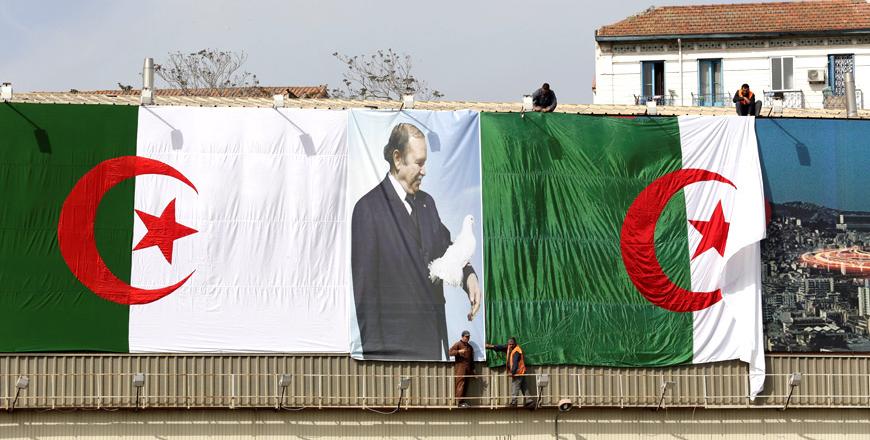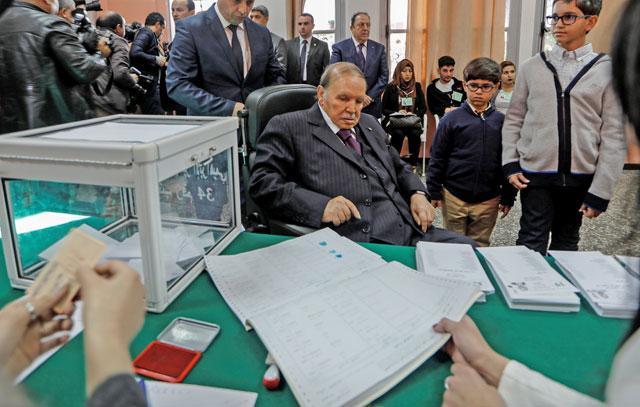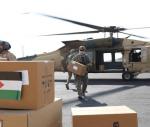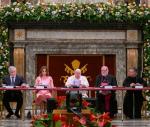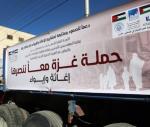You are here
Algerians vote for new parliament in ballot marked by youth apathy
By Reuters - May 05,2017 - Last updated at May 05,2017
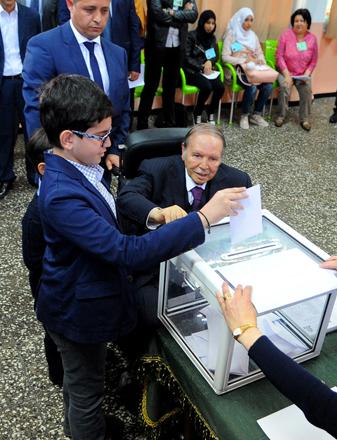
President of Algeria Abdelaziz Bouteflika casts his ballot to elect members of the country’s 462-seat parliament in Algiers, Algeria, on Thursday (Anadolu Agency photo)
ALGIERS — Algerian voters looked set to hand the ruling FLN and its allies another five-year mandate in a parliamentary election on Thursday overshadowed by low oil prices and concerns over the health of the country's elderly president, Abdelaziz Bouteflika.
Turnout is traditionally low in elections for the 462-seat National Assembly, which many Algerians see as offering little change in a political system dominated since independence in 1962 by the FLN, and social media has captured a mood of apathy among younger voters.
The National Liberation Front (FLN) and the pro-government National Rally for Democracy (RND) are widely expected to win against a divided opposition that includes leftists and Islamist Party alliances. Smaller parties have boycotted the vote.
"You have to vote. You can never leave the ballot box empty," said Morad Saadi, 49, a cleaning products salesman voting at a school in central Algiers, where voters, mainly the elderly and families, showed up early.
Government officials and ruling parties have tried to rally voters under the slogan "Let your voice be heard", mostly appealing to worries over security and continuity.
The interior ministry will announce the results of the vote on Friday morning.
The National Assembly has limited powers in the presidential system. A new constitution allows parliament a say in naming the prime minister but critics see it as a rubberstamp assembly.
In the 2012 election, the FLN won 221 seats and the RND 70 seats by playing the stability and security card following the 2011 Arab Spring revolts in Tunisia, Egypt and Libya. But turnout was just 43 per cent.
Bouteflika, 80, voted in Algiers from a wheelchair, helped by his young nephew. The veteran leader shook hands with police and polling station staff, but did not speak. Besides television images, it was his first public appearance since late last year.
In power for nearly two decades, Bouteflika is widely praised for bringing the country out of a decade-long 1990s war with Islamist militants that killed 200,000 people and left many Algerians still wary of instability.
Bouteflika, a veteran of the war against colonial France, also oversaw a period of high oil prices that financed a massive welfare system from cheap housing and subsidised fuel and food programmes with roots in Algeria's post-independence socialism.
But a stroke in 2013 left him in hospital for months. Since then he has mostly been seen in brief state television images greeting dignitaries. He was re-elected in 2014 but did not campaign himself.
Generation gab
The FLN and RND benefit from association with Bouteflika and the government's public spending. They also gain from a low turnout as their core supporters among the elderly, public workers and the armed forces are the most likely to vote. In addition, the FLN have a strong party machinery in rural areas.
But more than half of Algeria's population is under 30, and many younger people say they feel little connection to the rhetoric of their country's leadership.
With the economy largely run by the state, many young Algerians complain there are few opportunities for them.
During campaigning, social media has reflected a lack of interest among younger voters. One video by local comedian DZ Joker pulled nearly 4 million views on YouTube with a take on Algeria's social problems entitled "Mansotich" a wordplay on "I will not jump" to refer to voting.
"For five years we don't see congressmen and we have no right to talk to them. Then they ask for our vote? Why should we, it's wrong," said Idir, a student in downtown Algiers.
The collapse of oil prices in mid-2014 has bought new challenges for an economy still dependent on energy revenues for 60 per cent of its budget and reliant on imports because of feeble national production outside energy.
Falling earnings —state oil company Sonatrach revenues slumped to $27.5 billion in 2016 from $60 billion in 2014 — have forced the government to cut spending and start the sensitive task of reforming subsidies on cheap fuel and electricity.
Government officials say they want to reform the costly subsidy system but promise to maintain key benefits that have helped Algeria weather social tensions in the past, including during the Arab Spring uprisings.
Related Articles
ALGIERS — In a sports arena festooned with national flags, Algeria's ruling FLN Party pumped up supporters at one final weekend rally before
ALGIERS — Algerians trickled to the polls Thursday to vote in local elections after a low-key campaign that has brought no expectation of ch
ALGIERS — Algeria’s ruling parties retained their majority in local elections, taking more than 50 per cent of the vote, the interior minist


